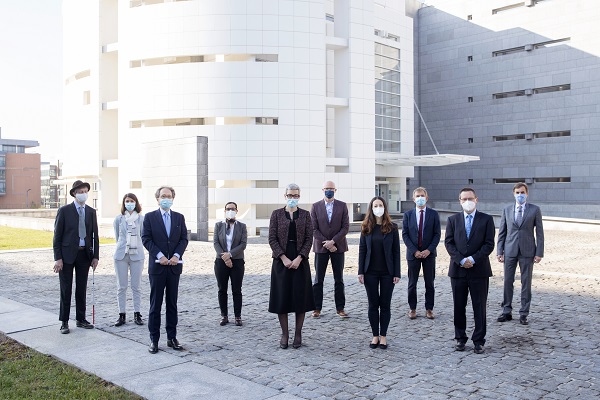 First "Assises du Code civil": (5th from left) Sam Tanson, Luxembourg's Minister of Justice;
Credit: MJUST / Sophie Margue
First "Assises du Code civil": (5th from left) Sam Tanson, Luxembourg's Minister of Justice;
Credit: MJUST / Sophie Margue
On Friday 7 May 2021, Luxembourg's Ministry of Justice held the first session of the "Assises du Code civil", which launched the process of reflection and reform of the Luxembourg Civil Code.
On the initiative of Luxembourg's Minister of Justice, Sam Tanson, the Assises brought together researchers and practitioners from Luxembourg, France and Belgium to lay the methodological foundations of the reform process.
In her welcoming address, Minister Sam Tanson stressed the importance and urgency of reform. In Luxembourg, entire parts of the Civil Code have remained virtually unchanged since its enactment.
The Justice Minister of Justice ended her speech by insisting: “Some of the principles which guided the drafters of the Civil Code 200 years ago have remained valid. [For instance] individual freedom, the equality of citizens, the need for a clear, coherent and accessible law or even contractual balance. But the keystone of our rule of law is today more than ever formed by human rights, as well as by the texts and international institutions which protect them. This is why any legislative reform must always be approached through the prism of fundamental rights”.
During the Assises, two reform models were weighed: on the one hand, the technocratic approach based on an alliance of scholars and politicians often used in the 1990s and on the other hand, the more recent bottom-up approach of a think tank made up of practitioners and researchers. The latter received the most support from participants.
Through the quality of its speakers, the contribution of more than 220 registered attendees and the feedback collected through online questionnaires, the first "Assises du Code civil" opened up a participatory path for the preparation of future reforms, with the goal of broad support for the texts to be adopted and their application.
The second session will take place on 15 October 2021 and will build on the contributions of this first day to identify the priorities of the reform on which the Ministry of Justice and the Luxembourg private law reflection group (Groupe de réflexion en droit privé luxembourgeois) will focus their joint efforts in the years to come.









